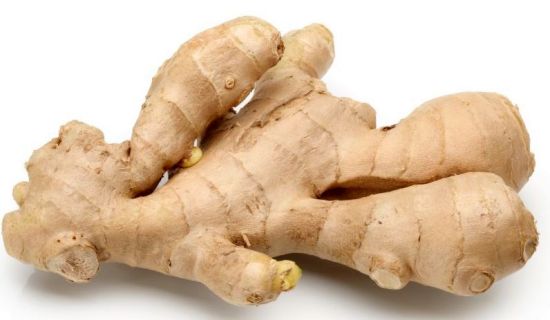Ginger and Herbs
 Another great food for treating gout is ginger. A 2011 study that was published in the Annals of Biological Research found that ginger acted like a strong anti-inflammatory and lowered the symptoms of gout in mice just as effectively as the gout medication called indomethacin. Ginger is not only recognized as a spice that can ease gastrointestinal stress, but it also contains anti-inflammatory compounds known as gingerols. You can try and eat a tiny piece of ginger every day, but ginger can also be placed in a variety of meals. It is a great ingredient to add spice or flavor and there are multiple ways to use this ginger in your dishes. Ginger can also be made into a tea and can be used as an additive in any of your favorite teas. You can add ginger to lemonade; it goes great with honey and cane juice. You can also add ginger to any rice dish for flavoring or combine ginger with olive oil and garlic to make a delicious salad dressing. Some sufferers of gout simply use the ginger as a paste. They mix it with water and apply the mixture topically on the affected area during or after a gout attack. You can also boil water containing ginger and soak a hot towel in the water, then simply place the hot/warm towel over the affected area. Other types of herbs that increase the excretion of uric acid include: parsley, celery seed, and nettle leaf. You can make an herbal tea using nettles to rid the body of high levels of uric acid. You can start mixing your own juices that contain exceptional ingredients to reduce your pain from gout. Some examples of ingredients to mix into a juice include: citrus fruits, vitamin C rich foods, carrots, celery, and parsley. It could be a creative way to increase your consumption of beneficial foods for your gout.
Another great food for treating gout is ginger. A 2011 study that was published in the Annals of Biological Research found that ginger acted like a strong anti-inflammatory and lowered the symptoms of gout in mice just as effectively as the gout medication called indomethacin. Ginger is not only recognized as a spice that can ease gastrointestinal stress, but it also contains anti-inflammatory compounds known as gingerols. You can try and eat a tiny piece of ginger every day, but ginger can also be placed in a variety of meals. It is a great ingredient to add spice or flavor and there are multiple ways to use this ginger in your dishes. Ginger can also be made into a tea and can be used as an additive in any of your favorite teas. You can add ginger to lemonade; it goes great with honey and cane juice. You can also add ginger to any rice dish for flavoring or combine ginger with olive oil and garlic to make a delicious salad dressing. Some sufferers of gout simply use the ginger as a paste. They mix it with water and apply the mixture topically on the affected area during or after a gout attack. You can also boil water containing ginger and soak a hot towel in the water, then simply place the hot/warm towel over the affected area. Other types of herbs that increase the excretion of uric acid include: parsley, celery seed, and nettle leaf. You can make an herbal tea using nettles to rid the body of high levels of uric acid. You can start mixing your own juices that contain exceptional ingredients to reduce your pain from gout. Some examples of ingredients to mix into a juice include: citrus fruits, vitamin C rich foods, carrots, celery, and parsley. It could be a creative way to increase your consumption of beneficial foods for your gout.

